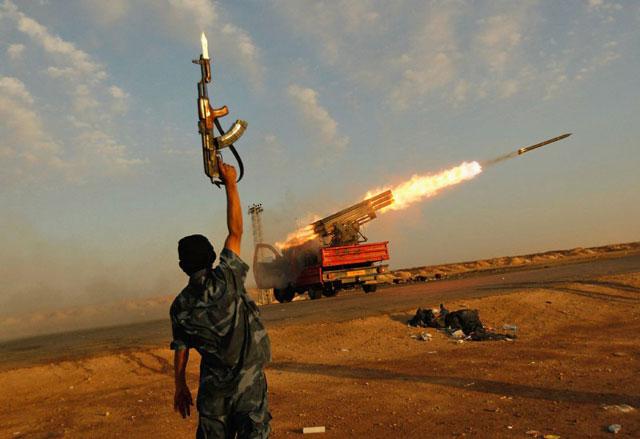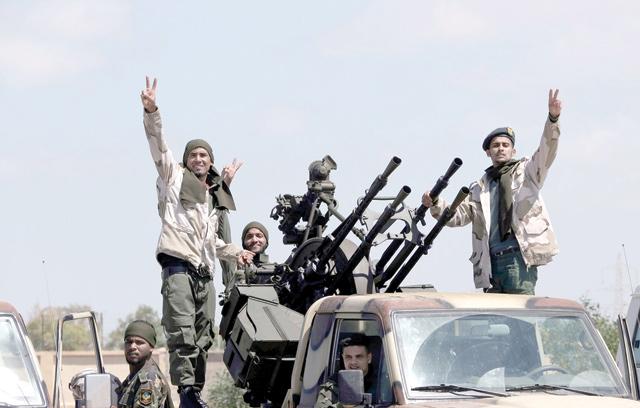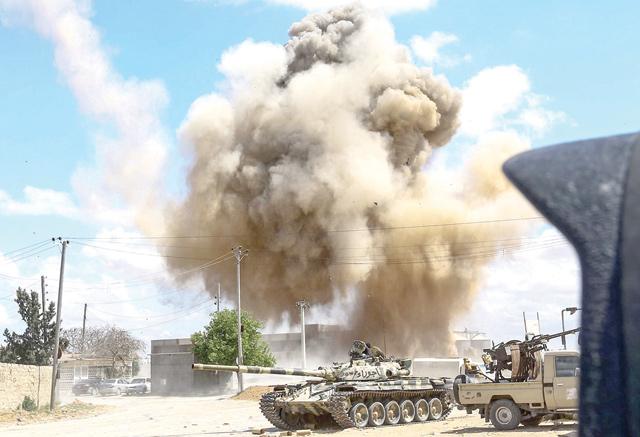You are here
Main fighting forces in Libya
By AFP - Nov 11,2018 - Last updated at Nov 11,2018

A rebel fighter celebrates as his comrades fire a rocket at troops loyal to Muammar Qaddhafi near Ajdabiyah in Libya on April 21, 2011 (File photo)
TRIPOLI — Since Libyan dictator Muammar Qadhafi was driven from power and killed in 2011, the power vacuum has been filled by a multitude of armed groups.
Here are the main fighting forces:
West
Tripoli: Three important militias support the Government of National Accord (GNA), which is backed by the United Nations.
The First Force operates in the east and centre of the capital.
Based in the east of Tripoli, the Salafist militia Force of Radaa (or Special Deterrence Forces) polices the city.
Its members arrest those caught trafficking drugs and alcohol, as well as detain people suspected of belonging to the Daesh group.
The Abu Slim Brigade controls the working-class neighbourhood of the same name in southern Tripoli.
These pro-GNA militias last year ousted numerous armed groups loyal to Khalifa Ghweil, head of an unrecognised government before the UN-backed administration came to power.
Once driven from Tripoli, those fighters mostly returned to Misrata to the east of the capital.
In September armed groups in Tripoli prevented militias from Tarhuna, southeast of the city, from entering the capital. More than 100 people died in a month of fighting.
Misrata: The militias from Misrata, half way between Tripoli and Sirte, are divided by their support or hostility for the GNA.
Those against the Tripoli government are allied with Islamist armed groups which are loyal to Ghweil and Sheikh Sadek Al Ghariani, a controversial religious figure.
The groups from Misrata have a presence in both Tripoli and Qadhafi's hometown of Sirte.
Zintan: Fighters from Zintan were driven from Tripoli in 2014 and withdrew to their city southwest of the capital.
They are hostile to Islamists and have made clear their support for Khalifa Haftar, whose self-styled Libyan National Army dominates the country's east.
Zintan militias control the oilfields of western Libya.
The Amazighs: Coming notably from the towns of Jado, Nalut and Zuwara, the Amazighs control the Ras Jedir and Dhehiba border posts on the frontier with Tunisia.
The Benghazi Defence Brigades: The group is composed of Misrata militias and Islamist fighters who were driven firstly from Benghazi and then Derna by Haftar's forces.
Sabratha: A coastal city west of Tripoli, Sabratha became a key departure point for migrants crossing the Mediterranean to Europe.
It has been under the control of a pro-GNA Salafist group since 2017, following the ousting of a rival militia headed by a people smuggling kingpin.
East
Khalifa Haftar's self-styled Libyan National Army (LNA): The LNA controls most of eastern Libya, including the oil crescent and the Egyptian border. The LNA is also present in the centre and south of the country, including Kufra and Sebha.
In 2017, Haftar's fighters pushed forces of the Benghazi Revolutionaries' Shura Council out of the eastern city after three years of fighting.
Earlier this year they drove Islamist militias from the city of Derna, which had been the only area in the east of the country out of Haftar's control.
The LNA force is made up of former officers from the Libyan army, militiamen, fighters from allied tribes and Salafists.
Centre and south
The Fezzan region is known for its smuggling routes. It is a patchwork of tribal forces and ethic groups vying for control of the trade and the oil fields, as well as groups from Chad and Sudan.
The Tuaregs: They control the borders with southern Algeria and part of the frontier with Niger.
The Tubus: Present in areas bordering Niger, Chad and Sudan. There are regular clashes between the pro-Haftar Tubus and Arab tribes which support the GNA.
Daesh group: After being ousted from Sirte in December 2016, Daesh extremists withdrew to areas around the city and towards the south.
The group still poses a threat and it has carried out numerous recent attacks in Libya, targeting security checkpoints run by Haftar's forces and well as state institutions.
In May Daesh launched an assault on Libya's electoral commission in Tripoli, followed by an attack on Libya's National Oil Company in September.
Related Articles
TRIPOLI — The conflict shaking Libya escalated Sunday as forces of strongman Khalifa Haftar launched an air strike on a suburb of Tripoli an
TRIPOLI — Escalating tensions between rival Libyan armed forces threaten to plunge the North African country deeper into turmoil only weeks
TRIPOLI — Libyan strongman Khalifa Haftar's capture of the strategic city of Sirte on Monday was a major setback for Tripoli's UN-recognised













